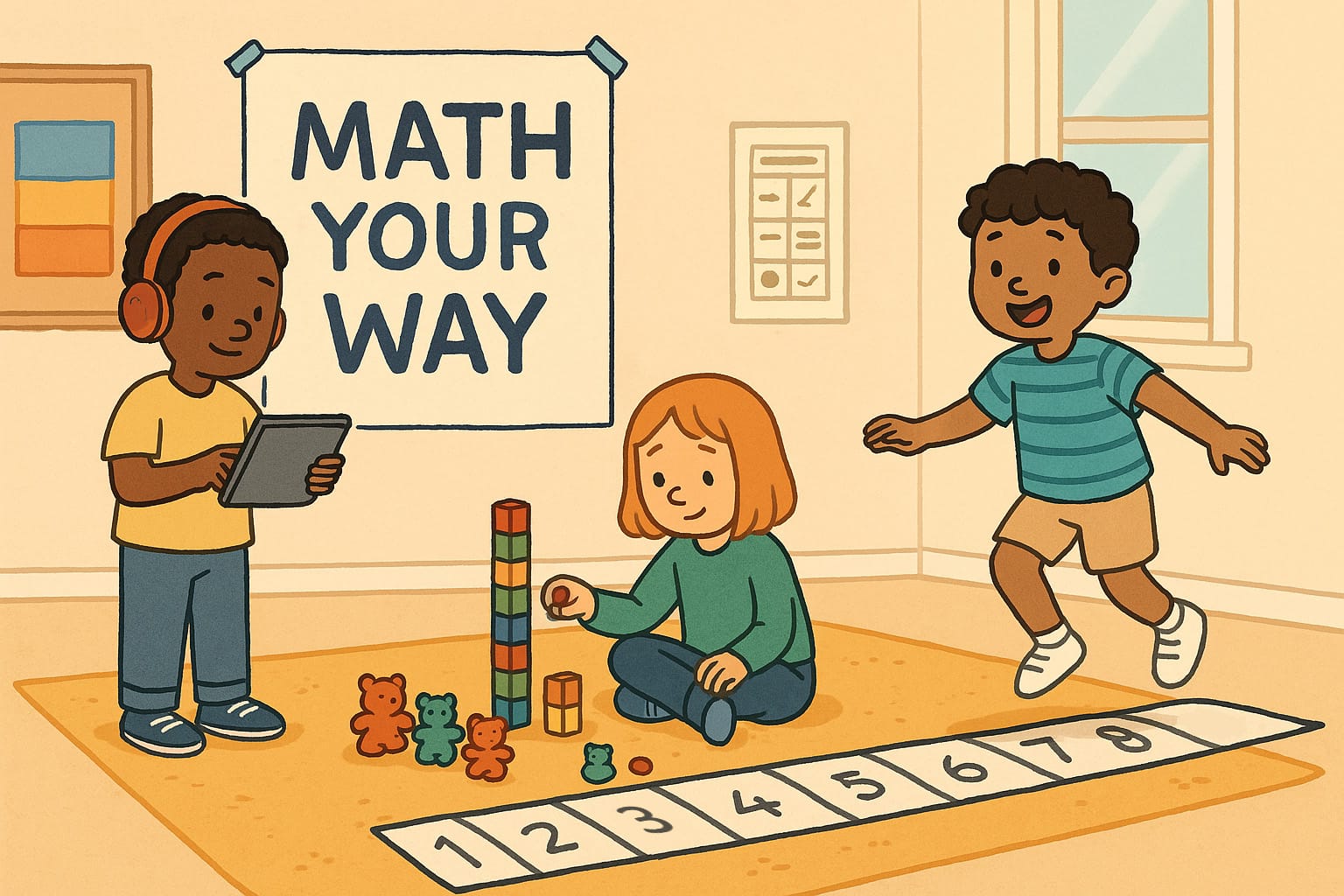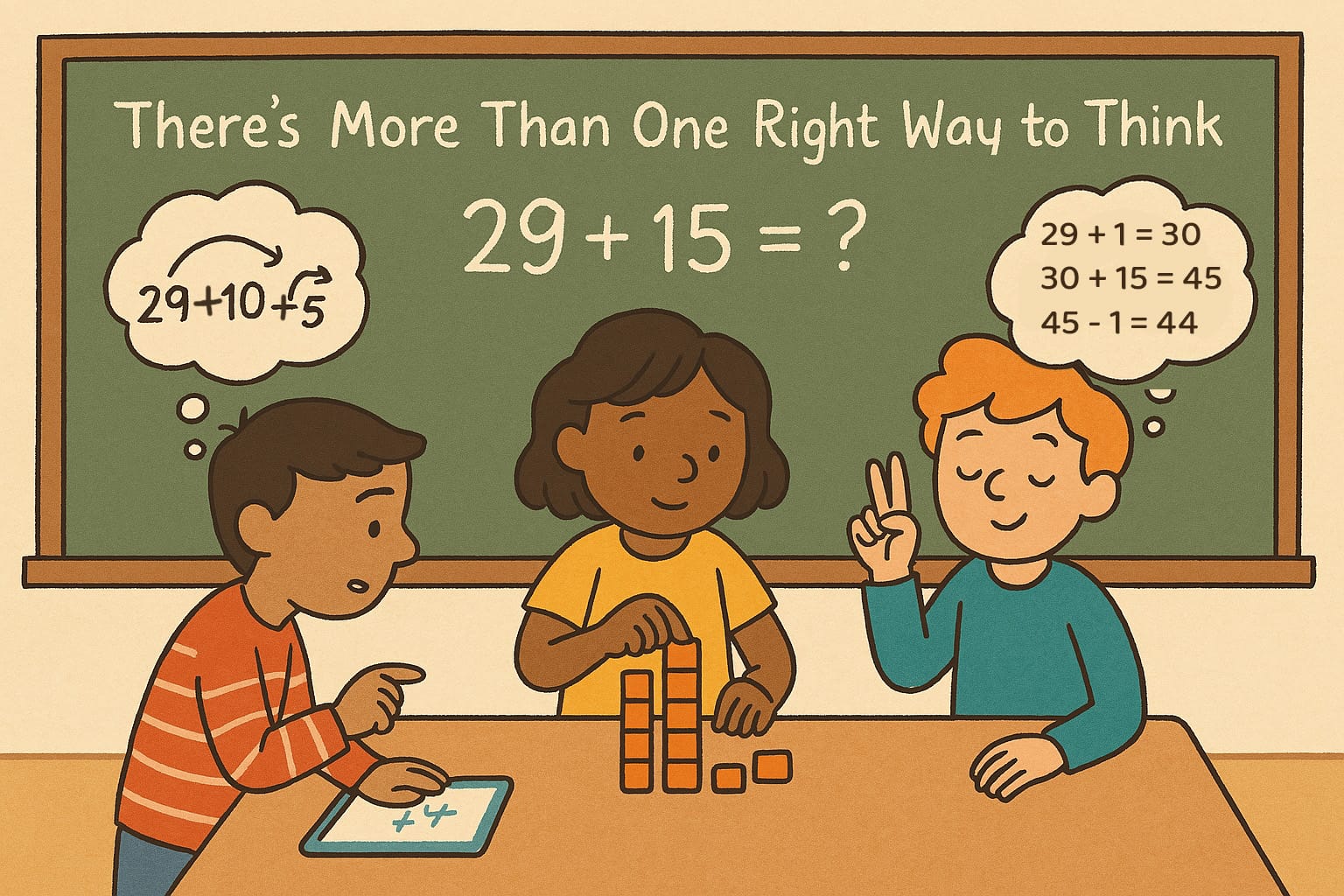Neurodivergent Math Learning: Strategies That Actually Work for Your Child
Updated on 6-Jun-2025
“He just zones out.”
“She knows it at home, but freezes during the test.”
If you're parenting a neurodivergent child - whether they’ve been diagnosed with ADHD, autism, dyscalculia, or are just ‘quirky’ learners when it comes to Math - you’ve probably heard these phrases. Maybe you’ve said them yourself.
And here’s the truth: your child is not necessarily bad at math. They are navigating a system that wasn't designed for how their brain works.
Let’s explore how to adapt math learning to meet their unique needs.
Understanding Neurodivergence in Math Learning
Neurodivergent learners process information differently, which can impact how they engage with math. Some examples of this are -
- ADHD: Challenges with attention, working memory, and task persistence.
- Autism: Sensory sensitivities, preference for routines, and unique learning styles.
- Dyscalculia: Difficulty understanding numbers and mathematical concepts.
- Executive Function Disorders: Struggles with planning, sequencing, and flexible thinking.
Note: There are many other forms of Neurodivergence that we are not covering here, because we are writing in the context of Math learning.
Traditional methods like timed drills and rote memorization often exacerbate these challenges, leading to frustration and disengagement.
Why Rote Memorization Often Backfires
Many classrooms emphasize memorization through flashcards and speed tests. However, for neurodivergent learners, this approach can be counterproductive. Rote memorization can increase anxiety, particularly in children with ADHD.
Instead, building math fact fluency through number sense, patterns, and visual strategies provides a more effective foundation.
Executive Function and Multi-Step Math Problems
Build cognitive flexibility with our guide on flexible thinking in math—perfect for ADHD and Autism.
If word problems derail your child, these six research‑backed fixes can help kids with dyslexia keep track of information and steps.
Struggling with multi-step problems isn't always about understanding math concepts. Often, it's related to working memory and executive function challenges. This article delves into how executive function impacts math learning and offers practical strategies to support your child.
Sensory Environment Tweaks
Lighting, noise and seating can make or break focus. Our latest deep dive on sensory‑proofing math spaces shows small adjustments that dramatically improve retention for autistic and ADHD learners.
Supporting Autistic Learners in Math
Children on the autism spectrum may experience sensory overload and have strong preferences for structure. Creating a sensory-friendly math environment can make a significant difference. Explore ideas for sensory-friendly math activities designed specifically for autistic learners.
Need a step-by-step plan for automaticity that respects sensory needs? See how to build math-fact fluency for kids with autism.
Additionally, establishing consistent math routines can provide the predictability that autistic children often thrive on. Learn more about math routines that support autistic kids.
Addressing Co-occurring ADHD and Dyscalculia
ADHD and dyscalculia often co-occur, creating unique learning challenges. Understanding how these conditions intersect can inform more effective support strategies. Our article on ADHD and dyscalculia explores this topic in depth.
Still seeing anxiety spikes? Here’s why some ADHD kids ‘freeze’ at math—and what actually helps.
Helping Kids with Dyscalculia
Early number intuition matters too—see how subitizing activities strengthen rapid quantity recognition before formal counting.
Kids with Dyscalculia struggle perceiving and manipulating quantities. Even at younger ages, they struggle with Subitizing or placing numbers on a number line. Our article on How to build Number Sense in Kids with Dyscalculia digs into this and also how to support them in building Math Fact Fluency
Need a deeper dive into tactile fraction work? Explore our latest guide on fraction sense for Dyscalculia kids which walks you through clay models, pattern blocks, and more.

Effective Strategies for Neurodivergent Math Learners
Curious about hands‑on kits? See if Montessori math tools fit your child.
Visual learners? Check out visual math strategies that work.
Number lines aren’t just for class—learn why in The Transformative Power of Number Lines.
See concrete‑to‑abstract in action with our parent’s CRA guide.
- Multisensory Learning: Incorporate visual, auditory, and kinesthetic elements to reinforce concepts.
- Chunking Information: Break down complex problems into manageable steps.
- Use of Technology: Leverage educational apps designed for neurodivergent learners, such as Monster Math.
- Positive Reinforcement: Celebrate small victories to build confidence and motivation.
For more detailed strategies, refer to our guide on managing math homework for neurodivergent kids.
Moving Beyond Myths About Neurodivergent Learners
Shift mindset at home using these growth‑mindset math scripts.
Many ADHD learners do struggle with focus - but that doesn’t mean they all struggle with math. Similarly, not all autistic kids are “naturally good at math,” despite the common stereotype. (read: Are Autistic Kids And Adults Really Good at Math?) These myths can lead to mismatched expectations, where some children are unfairly pressured to perform while others are underestimated or left behind.
Every neurodivergent child brings a unique learning profile. Some thrive with visual models. Others prefer repetition and routine. Some need movement breaks every few minutes. The key is not assuming — but observing, adapting, and responding to what works for your child.
Play-Based Learning: A Hidden Superpower
Math doesn't have to happen at a desk. For neurodivergent kids, games can often bypass the resistance and anxiety triggered by worksheets. In fact, play may be the most powerful (and underused) teaching tool you have.
Our curated list of math games for ADHD learners is a great place to start. Each game supports executive function, number sense, and flexible thinking - without feeling like “school.”
Prefer a more tactile, screen-free approach? Check out these math board games that kids with ADHD actually enjoy.
Planning and Homework Without Meltdowns
Help ADHD kids own their learning with goal‑setting and self‑monitoring hacks.
One of the biggest pain points for parents of neurodivergent children? Homework. Even if the math is simple, the process of sitting down, starting, and finishing can feel like a mountain.
Learn how to support your child with time-blocked routines and task chunking in this time management guide for math homework. In this article, we’ve also shared a breakdown of what math homework could look like - without meltdowns.
Project-Based Learning
Multi‑day challenges keep motivation high. Try these mini engineering projects that blend STEM build‑play with real‑world math.
Introduce budgeting skills through play—these hands‑on money activities are ADHD‑friendly.
Turn movement into math with kinesthetic place‑value games.
Math doesn't have to happen at a desk. For neurodivergent kids, games can often bypass the resistance and anxiety triggered by worksheets. In fact, play may be the most powerful (and underused) teaching tool you have.
Planning and Homework Without Meltdowns
One of the biggest pain points for parents of neurodivergent children? Homework. Even if the math is simple, the process of sitting down, starting, and finishing can feel like a mountain.
Learn how to support your child with time-blocked routines and task chunking in this time management guide for math homework. In this article, we’ve also shared a breakdown of what math homework could look like - without meltdowns.
What Teachers and Parents Should Remember
There is no one-size-fits-all when it comes to math instruction. And for neurodivergent children, this is especially true. What looks like “laziness” or “defiance” is often a signal that the current approach isn’t working - and needs to change.

We’re not just teaching math facts. We’re shaping self-belief. A child who feels capable, understood, and supported in math will carry that confidence into every other subject - and far beyond school.
FAQs About Neurodivergent Math Learning
How can I identify if my child's math struggles are due to neurodivergence?
Observe if your child consistently faces challenges with attention, memory, or understanding math concepts, despite adequate instruction. Consult with educational professionals if you aren't sure. A formal diagnosis does help, though they can help you see the symptoms early.
Are there specific math programs designed for neurodivergent learners?
Yes, programs like Monster Math are tailored to support neurodivergent children by incorporating multisensory learning and adaptive challenges.
How can I support my child at home with math?
Start by making math feel less stressful. Use everyday situations like cooking, shopping, or playing games to explore math concepts. Avoid high-pressure drills, and instead opt for strategy-based approaches and games that build confidence while strengthening number sense.
Explore our post on what math fact fluency actually means to learn how to move beyond rote memorization at home.
Should I get a formal diagnosis for my child?
A formal diagnosis can definitely open doors to support in schools and better tailor your approach at home. However, it’s not always necessary to wait for the diagnosis to start using more inclusive, child-centered strategies. If your child is struggling, try adapting how you teach - not just what you teach.
Many principles of Math learning that work better for Neurodivergent kids also work well for Neurotypical kids (visual reinforcement, making it fun, focusing on number sense rather than memorizing, etc.). It's not that the traditional system is better for Neurotypical kids - it's just that they can tolerate it better than kids who are neurodivergent.
Empowering Neurodivergent Learners
Voice and choice matter. Use these self‑advocacy scripts to help kids express needs and celebrate strengths.
Internal Resources and Next Reads
- How ADHD Affects Math Learning (And What To Do About It)
- Math Fact Strategies vs Memorisation: What Works for ADHD Kids
- Visual Thinking in Dyscalculia
- Why Autistic Kids Get Stuck on Math Word Problems (and How to Help)
Final Thoughts: Build a Math World That Welcomes Every Brain
Neurodivergent children don’t need to be fixed. They need tools that work with their brains, not against them. And math - far from being a dreaded subject - can be a powerful place to start.
At Monster Math, we believe that every child deserves math resources they can love. Our mission is to help you build that world - one strategy, one story, and one small win at a time.
Because when we adapt the system to the child - not the other way around - magic happens.


Comments
Your comment has been submitted